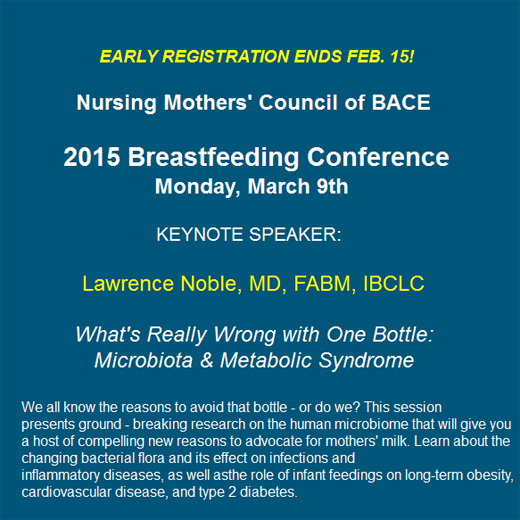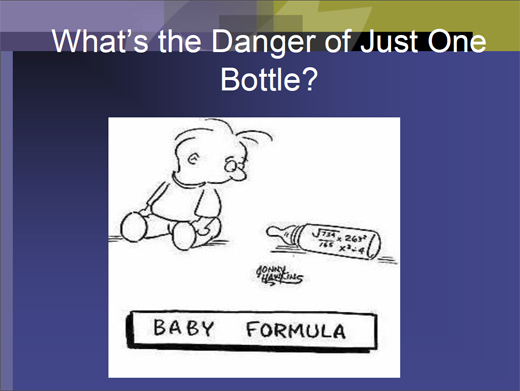It’s the third rail of contemporary parenting.
In a society in which intensive mothering (attachment parenting) is the dominant paradigm, though people are willing to acknowledge that idealized representation of perfect motherhood can contribute to postpartum mood disorders, no one dares note that the natural childbirth industry and the lactivism industry are front and center in a campaign to shame and humiliate new mothers.
Case in point, a conference that is going to take place in early March sponsored by BACE, the Boston Association of Childbirth Educators & Nursing Mothers Council. Here’s a portion of the email announcement:
Keynote Speaker Lawrence Noble, MD, FABM, IBCLC is going to speak on What’s Really Wrong with One Bottle: Microbiota & Metabolic Syndrome.
Spoiler alert:
What’s really wrong with one bottle of infant formula? Absolutely NOTHING!! Zip, zero, nada! That’s what the scientific evidence tells us.
So if there’s nothing wrong with one bottle of infant formula, what’s Dr. Noble going to talk about?
Presumably he is going to give the same talk that he gave last May.
He telegraphed his approach with this opening editorial cartoon:
He plans to baffle the attendees with bullshit!
See, look at that scary complicated math! How impressive that an important man like Dr. Noble can understand that stuff! It’s too hard for lil ol’ lactation consultants and childbirth educators. They’ll just have to lap up what he says and regurgitate to “counsel” their clients.
But I don’t have to take Dr. Noble’s word as truth. I’ve reviewed all 83 slides in that talk and there is NOT EVEN ONE that shows any evidence that a single bottle of formula causes any impact at all, let alone a harmful impact.
Looking over the slides, filled with cherry picked studies, discredited studies, and other nonsense, I had a sense of deja vu. It took me awhile to recognize why and suddenly I realized what this reminded me of. It reminded me of the pitches by Big Pharma detail men and women; elaborate presentations packed with slides and statistics that ultimately prove nothing but are designed to convince doctors to prescribe the drugs they are selling.
Dr. Noble is not shilling for Big Pharma, but he is promoting an industry, the lactation industry.
The lactation industry arose as women commercialized what they had previously given to each other for free: advice on how to breastfeed. Now the very same hints and tips cost $100/hour or more. Their biggest competition in efforts to profit from breastfeeding is infant formula. That’s why they’ve embarked on a campaign to demonize formula, the truth be damned.
But the War on Formula has other casualties besides formula sales. The War on Formula is a war on women.
In its impact on women’s health, mental health, economic health, and ability to reach their fullest potential, infant formula is akin to the birth control pill.
Just as the Pill allowed women to control their own bodies, effectively separating the decision to have sex from the potentially unwanted children that could result, infant formula has allowed women to control their own bodies, effectively separating the decision to have and nurture children from the potentially unwanted need to stay with them 24/7/365 and therefore forgo income and career. It also has allowed women who cannot trust their own bodies to produce enough breastmilk to nourish their children just as effectively as if they were breastfeeding. Sure, breastfeeding has benefits, but in an industrialized society with clean water, those benefits are trivial.
The lactation industry wants to go beyond a war on women’s income and women’s careers to a war on women themselves, by promoting humiliation and guilt among new mothers. That’s the primary message of Dr. Noble’s talk. There is no harm from one bottle of infant formula. In fact, the scientific evidence strongly indicates that there is no harm from exclusive use of formula. But how deliciously humiliating and guilt producing to emotionally fragile new mothers to pretend that one bottle of formula is harmful! How delightful to pretend that new mothers should be bullied into breastfeeding for the good of their babies (when the people who are really benefiting are the lactation consultants and their industry)!
Imagine if we tried to address smoking related illness by humiliating anyone who ever had ONE cigarette. Imagine if we tried to address obesity by shaming anyone who ever ate even ONCE at McDonald’s. That’s absurd, right? But that’s the equivalent of what the lactation industry is doing.
Make no mistake, I support breastfeeding; I’ve breastfed 4 children and I enjoyed it. But I also used formula, too and that improved the quality of my life and my children’s lives.
The War on Formula is not justified by scientific evidence, merely by the profits of the lactation industry. If that were all there was to it, the lactation industry would be no different than any other industry such as Big Pharma.
But the War on Formula is a war on women. Talks like Dr. Noble’s are just battle orders on how to shame, humiliate and bully women into breastfeeding regardless of whether it is the right choice for them or the right choice for their families.




